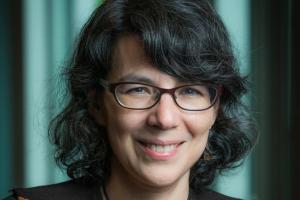
Associate Professor Karin Mickelson has been with the law school for more than 25 years, first as a student, then as a faculty member. She is a leading international scholar in the area of international environmental law, especially as it relates to global inequity. Professor Mickelson has taught in the areas of international law, international environmental law, real property, environmental law and legal theory, and has supervised and co-supervised graduate students in a wide range of areas including international environmental law, international legal theory and international human rights. She has also served as the faculty advisor to UBC teams participating in the Jessup International Law Moot Court Competition.
How would you describe your research interests in a few sentences?
I work mainly at the interface between international environmental law and the international law of South-North relations, trying to understand international environmental law in terms of the impact it has on the peoples of the Third World. I use the terms “South-North’ and ‘Third World’ deliberately, as my research has a strong focus on the historical components of those relationships.
How did you get into the field of international environmental law?
I think the work I do today can be traced back to childhood. I grew up in Bolivia, seeing other children who looked like me but were living in conditions of extreme poverty. The impact of that on me as a child, and the need to understand the broader context of global inequality, continues to drive my work today.
When I began law school, I actually wanted to be a human rights activist. I came to environmental protection as a human rights issue – I saw the enormous impact that environmental degradation can have on human rights. Once I got into the field of international environmental law, I felt that I didn’t have a choice – this was just what I needed to do. It seemed to be an imperative to me.
It’s common for global environmental issues to be seen as a “crisis”. You’ve written about why that’s a problematic way to think about it. Why?
It’s a complex issue. On the one hand, there’s a sense that this needs to be seen as a crisis in order to foster the kind of commitment it’s going to take to address complex, long-term environmental challenges. How do we generate and maintain that commitment if the issue is not seen to be a crisis? On the other hand, seeing it as a crisis can be paralyzing and lead to helplessness and inaction, with an attitude of “We’re on a runaway train with no solution so we might as well just have fun and not worry about it.”
Generally, my reaction to that is that we still live in a choosable world. If all these environmental issues were just predetermined or beyond hope, then there would be no choice. Bu we do have choice. We are not doomed to follow this pattern; we can change the course.
What would it take to “change the course”?
That’s a tough question. Well, I don’t think that tinkering at the margins is going to help. I think it’s going to involve a fundamental rethinking about ideas of economic prosperity, a rethinking about what it means to live a good life. What it takes for us to rethink it in that way? I wish I knew.
I think that that’s one of the reasons, though, that I regard teaching as so vitally important. This will require efforts from so many people in so many ways, and I see my students going out there and changing the world.
Do you have any advice for alumni who might want to get more involved in environmental issues?
Not to assume that the only way to promote environmental sustainability is through public interest work. There are different ways to work towards the same goals. The great thing about a legal education is the ability to understand complex issues and see different sides of things. Be open-minded about how your legal training can help. Whatever field you work in, you can keep yourself informed and be part of efforts to engage in these issues.
You are a UBC Law alumna and have been a faculty member here since the early 1990s. What makes UBC Law the best place for your work?
We have amazing students. It’s a real privilege to be able to teach these talented, interesting people from such a wide variety of backgrounds. We’re part of a university that really tries to take sustainability seriously, and we’re in a province in which environmental issues are hotly debated and linked with other fundamental concerns such as justice for Indigenous peoples.
First published on July 22, 2016.